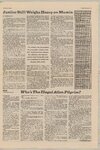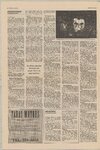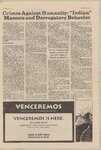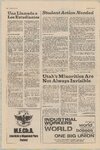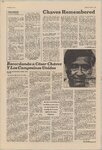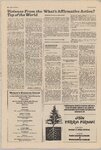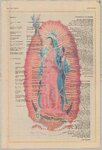| OCR Text |
Show SPRING VENCEREMOS 13 2000 by Patrisia Gonzales and Roberto Rodriguez Universal Press Syndicate Martin Luther King Jr. was undoubtedly one of the greatest personages of the 20th century, so it seems appropriate to honor him with our first column of 2000. Some have suggested that the way to honor him is to convert his legal holiday into a day of volunteer service. Another way to honor him would be to convert his holiday into a day of action: that we each implement what he believed in and what he stood for—justice for all. How we go about doing that seems a bit more difficult than merely volunteering at a soup kitchen for a day. What MLK proposed was something radical: creating dignity for all human beings rather than simply contributing to charity (though “ustice for all” is not exactly a radical idea). Working toward that precept requires that we understand who currently has justice and who does not. One can easily find that out by visiting a jail or a prison or an Immigration and Naturalization Service detention center. One can also see the same kinds of people at shelters for the homeless and for battered women — a lot of color. (We should add, though, that poverty and despair know no color boundaries.) These kinds of centers can always use a helping hand, but MLK day should be an empowering day. It's akin to the adage that you can either feed a hungry person for a day.or you can a CHAVEZ continued from page 11 Joaquin Valley in 1953. This was the era of McCarthyism, and anyone who registered and encouraged Mexican Americans to vote was a suspected communist. Subsequently investigated by the HUAC (House Unamerican Activities Committee), Cesar and his family decided to move back to San Jose. During the next few years Chavez quietly rose to the leadership of the whole national CSO organization. In 1958 and 1959, he. organized the farm workers in Oxnard against the inequities of the bracero program. This program pitted domestic farm workers against laborers brought from Mexico, who would work for very low wages. Even though Public Law 78 provided work cards to domestic workers, the cards were worthless when braceros were available. Throughout this period, Cesar Chavez pushed the CSO to support a new union of farm workers, but when his motion for such a union was voted down in March 1962, Cesar resigned his CSO position. Moving his family to Delano, Helen got a job picking grapes, and Cesar worked tirelessly toward his dream of a union for farm workers. In September 1962, the first real meeting of the national Farm Workers Association to place in Fresno. It would later grow into the United Farm Workers. Chavez called the first UFW strike in September 1965, followed by hunger strikes and a national boycott of grapes in 1968, that culminated in the signing of a three-year contract with California grape growers in 1970. It was a major victory, and during this decade union membership reached a peak of more than 70,000. The UFW became a training ground for broader Chicano political activism. Other accomplishments included health benefits for workers and the formation of a credit union. Despite the increased attention to the sois iviLs teach the person how to fish for a lifetime. Similarly, anyone can visit prisoners and read to them, or one could instead use that day to ask our legislators why we are building prisons at a faster rate than we're building universities. The higher education community is well aware that we're in the midst of a second baby boom, yet rather than building more colleges and universities, they are generally calling for tightening and restricting admissions. The prison-building industry, on the other hand, is planning for explosive growth. In effect, we're accommodating a future with higher rates of incarceration, and we are ensuring that universities return to their days of exclusion and elitism. In California, the state that leads the nation in trend-setting retrograde propositions, another one is coming down the pipe: Proposition 21. This one would treat 14-year olds in the judicial system as adults, thus ensuring the prison-building industry with a steady stream of brown and black bodies. Fighting against this industry and against laws that will send more people of color to prison may not be as romantic as celebrating early civil rights victories, but it would certainly be more in the spirit of that era. In fact, there's a resegregation that's taking. place in our society, and the education, prison and military-industrial complexes are inexorably linked to this process. The more money for the Military, the less money for education. The less money for educa- tion, the greater the pool of uneducated poor. And the greater that pool, the greater the need for warehouse prisons. A society that attempts to incarcerate its problems will soon find itself with a highly stratified racial caste system, with those at the bottom being economically and politically powerless. Incarceration produces unemployability and a large population of ex-prisoners who cannot vote—a population with no power and no stake in the future of our society, a highly volatile mix. “For those who believe-that only the guilty go to prison, we point to the current corruption scandal at the Los Angeles Police Department. And we also stress that this scandal is anything but, -. unique here in the United States. Thousands of cases have to be reviewed and could be potentially thrown out because of police frame-ups and false testimonies. What we've learned thus far is that many poor defendants cop to guilty pleas—even when not guilty—because they know the system is stacked against them. Yet even if everyone in prison was locked up on a genuine charge, we as a society must find a better way to deal with them. It has been said that societies are judged by how they treat their prisoners. In that case, we're failing miserably. We might add that we should be judged by how we treat the potential of all human beings because except for, say, certain sociopathic killers, everyone is salvageable and everyone deserves human dignity. se + E workers' plight, and some modest gains tained commitment to nonviolent politiduring this period such as a $7 per hour cal activism. The decision now before the entry wage, the UFW grew weak, so that UFW is whether to continue seeking support from middle-class consumers, as “by the time the Republican Party-backed growers moved against the union in the some have criticized UFW for doing, or 1980's, the movement lacked the shifts its focus to organizing the farm strength to resist. workers in the fields. Membership dropped to 10,000 and the In his book, Youth Identity and Power, many gains that were made were lost. Carlos Muñoz Jr. stresses that Chavez A statement made by Chavez quoted in “...did not consider himself to be a ChiCarol Disco's Nov. 24 1986 Salt Lake Tricano leader but the organizer of a union bune Article holds true today: “There is representing a multi-racial constituency no difference in the working conditions of rank-and-file workers,” today [from those in 1937]. There is a Despite his reluctance to see himself as huge labor surplus and fierce competia Chicano leader, as opposed to a labor tion for jobs. leader, Chavez was consistently acknowlThe workers have low wages, and bad edged as the primary leader of the Chiworking conditions, long hours and cano movement. they're not able to file Muñoz sums up his grievances.” assessment of the role of Why was the UFW The UFW became (A Chavez: “It is nevertheunable to fight the politiless true that many Mexical onslaught of the last training ground for can American student decade? activists, including this Frank Bardacke, a for- broader Chicano politi- author, were inspired by mer UFW activist, Chavez, and many rank(Cesar's Ghost, The cal activism. and-file union members Nation, July 26/Aug. 2, came to identify with the 1993) offers a frank goals of _the Chicano. account of why the UFW ceásed to be an movement.” effective farm-worker organization. Chavez was certainly” he first Mexican A critical mistake was removing the. American to receive national recognition strongest farm worker activists from the' and support for his cause. fields to work in the boycott offices, thus The struggle of the farm workers in weakening farm-worker organization California, led by Cesar Chavez, had a and causing the UFW to grow further out significant impact on the emerging Mexiof touch with farm worker concerns. And, can-American student activists of the citing interviews with former UFW staff early sixties. members , Bardacke concludes that Particularly important was the Plan de “Chavez's authoritarian style and the Delano, written by Luis Valdez, after lack of democracy within the UFW,” members of the National Farm Workers allowed no room for secondary leadership Association voted to unite with striking to develop within the union. Filipina/o grape pickers. This document Bardacke's appraisal does not underdefined the struggle of the farm workers mine the UFW's current struggle, or as a “nonviolent revolution for social juscompromise the dignity, self-sacrifice, tice led by the sons of the Mexican Revoand the tremendous influence of Chavez. lution.” Rather, it puts the UFW's history and It called for the uniting of all poor farm Chavez's role in a proper light, allowing workers throughout the country. : the UFW to recognize past human misStudent activists began forming orgatakes and to continue in the spirit of nizations that, for the most part, dealt Chavez and the larger Chicano movewith Mexican American issues, and sponment, seeking social justice through sussored demonstrations and programs sup- porting Chavez, along with other leaders of the Chicana/o movement. i Mexican American student a was enriched by their pride in the. national recognition of Chavez, who in 1967, was the first Mexican American leader to appear on the cover of Time Magazine. In the 1980s, Cesar Chavez was again very much in the public eye as he staged boycotts and personal fasts to protest the danger of pesticides. In an editorial in Food and Justice, May 1988, Chavez stated, “We are in the midst of a major toxic disaster in the farming communities of California... Children are dying, babies are born deformed, farm workers are poisoned and the rest of us wait to see how much pesticide residue is too much for human consumption.” “Cesar Chavez knew that the solution to this deadly crisis would “not be found in the arrogance of the powerful but in the solidarity. with the weak and helpless.” : During his fast for life he offered a plea: “I pray to God that this fast will be a preparation for a multitude of simple deeds of justice, carried out by men and women whose hearts are focused on the suffering of the poor and who yearn, with us, for a better world.” Nearly a year after his death, many wonder what impact Cesar's death will have on the unity of La Raza, and the' Chicano movement. Anthony M. Navarrete, writing for the June 1993 edition of VOZ FRONTERIZA (San Diego, California) asks, “...what would Cesar Chavez himself wish his legacy to be? Do we move in the direction of passive resistance —yet well designed; to the man's ideals and his politics? A true act of honoring Cesar Chavez is to continue the job he started and to take it further than even he envisioned. “Cesar Chavez will never be forgotten and his importance will never be truly. fathomed. ze The Struggle continues, Que viva Cesar Chavez! A TT King's Spirit Reigns Eternal |




